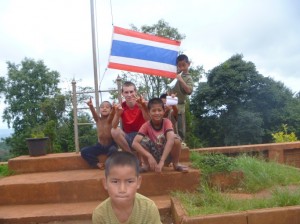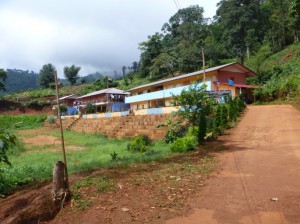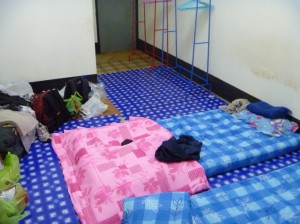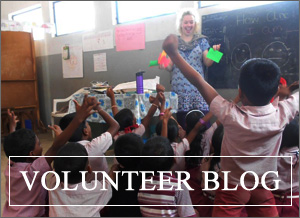VESL runs projects in rural parts of Chiang Rai in Thailand, these are unique projects in the mountainous regions of the province where the local villages are inhabited by various hill tribe populations.
Andrew Durrant, now a Keele University graduate, volunteered in a rural hill tribe project in 2012. Here Andrew talks about what the projects are like, his experience and why VESL volunteers should go back to the region.
If you’re interested in volunteering on a rural project, make sure you get your application form in soon!
Most of you who are thinking or going to Thailand with VESL will need to decide about kind of school and environment you want to be based in. VESL works with numerous worthwhile schools in the main centres of Chiang Rai, Phayao and Mae Chan. But also VESL has links with several schools in hill tribe and very rural areas that are in great need of more volunteers to be based there; continuing the good work that VESL has done in Thailand for several years. As a past volunteer in 2012 at a hill tribe school and a student leader this year in Mae Chan I feel that there is definitely a strong desire for more volunteers to work in these rural locations.
Why Volunteer in a Hill Tribe or a very rural school?
Rural and Hill Tribe schools suffer from higher social disadvantage. These areas are mainly inhabited by groups such as the Akha, Lahu and Karen people; many of whom are discriminated against by the standard population. These areas often receive significantly less government funding, which directly reflects in the facilities available and student: teacher ratio’s. English is often not taught as much or as well compared to schools in mainstream Thai society so there is fundamentally a real need for more volunteers from VESL to be based there.
What to expect?
- Expect it to be basic! You will more than likely find yourself living in school accommodation.
- Expect (cold) bucket showers and squat toilets
- Expect a bed raised only slightly off the floor
- Expect to eat rice, rice and more rice (maybe with a little bamboo) and whatever meat is going. Fresh fruit is often available, plentiful and sourced locally
- Expect to have temperamental internet and phone availability (given to the fact that it is delivered via satellite to these areas) – if available at all! Maybe someone’s idea of heaven?
- Expect it to be a lot cooler than your average Thailand temperature
BUT
- Expect to be welcomed into the community with a bang.
- Expect to be invited into all sorts of people’s houses for food
- Expect to see the children’s faces light up at the sight of a farang (foreigner). For these children this may be their first experience as they may never have left their community before.
- Expect to have the best time ever and come away from your experience equipped with stories that will last a lifetime.
- Expect to be proud of your achievements in contributing to the education of underprivileged children.
Who should you volunteer in a Hill Tribe?
- Anybody who is passionate about making a vital difference.
- Anybody who could cope without the creature comforts available at home.
- Anybody who doesn’t mind limited internet and phone access
- Anybody who is looking for an experience that will last a lifetime.
Not everyone is kitted out with the drive and determination to cope, contribute and enjoy their time in these locations. But those who do absolutely love it! I personally was very sceptical about going to my rural school placement before leaving, but once I was there is had the best experience of my time!
My Experience at Ban Doi Chang!
I was based in a rural school for 6 weeks in 2012. The school had approximately 150 students. Half were from the local Akha village and half were Burmese refugees or children from other villages and these all lived within school accommodation. There were 6 teachers there; all of whom lived in Chaing Rai and travelled home at the weekends. When I first arrived, myself and my partner were only the second batch of VESL volunteers to have been based there. We shared a small bedroom with ensuite! The school had basic computing facilities and phone reception was only available at the top of a hill (about a 5 minute walk). The English was very poor, there had been a year gap between volunteers and there is a lack of an English program at the school. But the student had a fun time learning, which in turn made my experience incredible. I was lucky enough to go back to my school this year as a student leader and see everyone – a remarkable experience!
If you are interested in volunteering at a hill tribe school or very rural school speak to the program manager Lauren or your student leader. I passionately hope more people choose to volunteer and live within these communities as they truly offer a unique experience unlike no other!
All the best and have an amazing time,
Andrew Durrant
P.S. These schools could really benefit from a long term volunteer! If anyone who is thinking of volunteering in one of these schools and would love more information, Lauren would be more than happy to provide my email address to you on request!






Comments are closed.